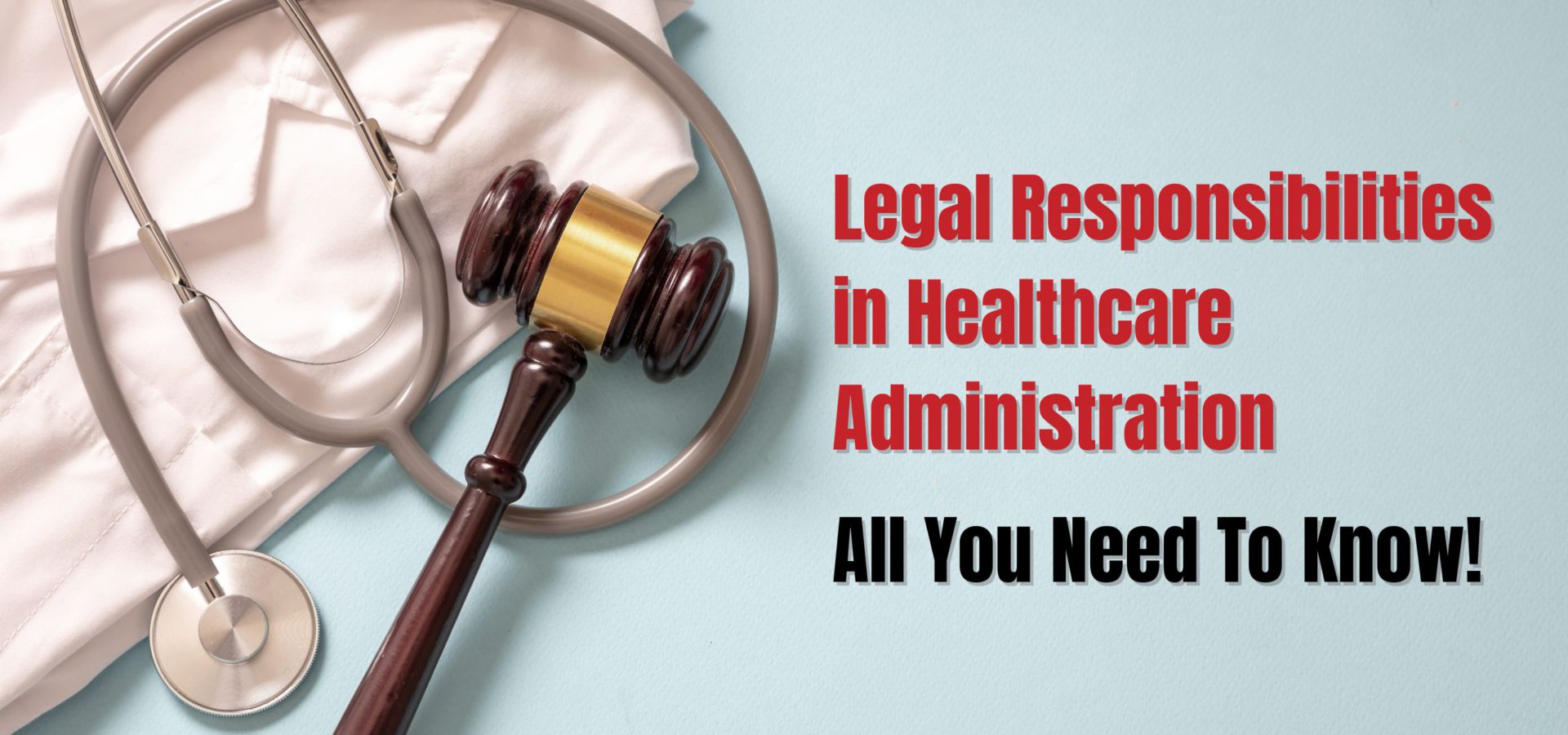Overview of Legal Responsibilities in Healthcare Administration in India
In India, healthcare administration is a complex field that involves managing patient care with strict legal compliance. As the healthcare sector grows, administrators & managers in the industry are tasked with not only ensuring high-quality patient services but also complying with legal responsibilities as per Indian law. A misstep in any legal area can result in serious consequences, ranging from financial penalties to reputational damage.
In this article, you will learn about the legal responsibilities in healthcare administration in India, including various regulations and frameworks, that healthcare professionals need to understand to operate ethically and legally.
Importance of Legal Responsibilities in Healthcare Management?
In India, healthcare managers and administrators have multifaceted roles. They are not only responsible for overseeing operations in healthcare organizations but must also ensure that every aspect of the facility aligns with fair legal compliance & regulations. A strong understanding of legal responsibilities in healthcare management helps organizations avoid legal disputes and enhances patient trust.
Key Areas of Legal Responsibilities
- Patient Rights and Confidentiality: Protecting patient rights is a top priority. This includes ensuring that patient information is confidential, well-protected, and handled in compliance with data protection laws like the Information Technology Act, 2000, which addresses data privacy.
- Compliance with Healthcare Laws: Healthcare administrators need to ensure that the facility complies with a wide range of Indian laws, such as the Indian Medical Council Act, the Consumer Protection Act, the Clinical Establishments Act, and laws governing biomedical waste management.
- Employee and Labor Laws: Compliance with labor laws is crucial, including adhering to the Maternity Benefit Act, the Employees’ State Insurance Act, and the Payment of Gratuity Act, to ensure that all staff rights are respected and upheld.

Legal Frameworks for Healthcare Professionals
India’s healthcare sector operates under a framework of laws designed to ensure that healthcare services are ethical, safe, and reliable. Understanding the legal frameworks for healthcare professionals helps administrators stay within the boundaries of the law.
Essential Legal Frameworks
Healthcare administrators need to stay updated with these laws and ensure that all operations adhere to the applicable standards.
- Indian Medical Council Act, 1956: Regulates the standard of medical education and practices in India, emphasizing the ethical responsibilities of healthcare providers.
- Consumer Protection Act, 2019: Patients hold the right to seek compensation for damages in cases of medical negligence, placing a greater responsibility on healthcare administrators to uphold high-quality standards and patient safety.
- Drugs and Cosmetics Act, 1940: Governs the import, manufacture, and distribution of drugs and cosmetics, with strict penalties for non-compliance.
- Clinical Establishments (Registration and Regulation) Act, 2010: A framework that mandates the registration of all clinical establishments to ensure uniformity in healthcare services across the country.
Patient Safety & Medical Negligence
One of the primary legal responsibilities in healthcare administration is to ensure patient safety. Medical negligence cases in India have gained prominence over the years, often leading to legal battles that can tarnish a hospital’s reputation. It is crucial for healthcare administrators to understand what constitutes medical negligence and take steps to minimize risks.
Steps to Ensure Patient Safety
- Standard Operating Procedures (SOPs): Implement clear SOPs for all clinical and non-clinical tasks. This standardization can reduce the risk of errors and serve as a legal safeguard in case of disputes.
- Medical Records: Accurate and well-maintained medical records are essential to defend against any legal claims. These records serve as evidence in legal disputes, making it critical for administrators to ensure they are comprehensive and up-to-date.
- Informed Consent: Prior to any medical intervention, obtaining informed consent from patients is a legal necessity. This involves clearly communicating the risks, benefits, and alternatives of a procedure to the patient, and documenting their consent.

Ensuring Compliance with Regulatory Authorities
Healthcare administrators must also comply with a range of regulations set forth by national and local health authorities. These regulatory requirements cover various aspects of healthcare delivery, from infrastructure standards to the qualifications of medical professionals.
Regulatory Bodies to Note
- National Accreditation Board for Hospitals & Healthcare Providers (NABH): NABH accreditation is a mark of excellence that showcases a healthcare facility’s commitment to quality. However, maintaining NABH compliance requires constant monitoring and audits.
- Central Drugs Standard Control Organization (CDSCO): Overseeing drug safety and regulation in India, this authority mandates stringent checks on drugs and medical devices used in hospitals.
- Pollution Control Boards: Compliance with the guidelines set by the Central and State Pollution Control Boards regarding waste management, particularly biomedical waste, is critical to avoid penalties.
Employment & Labor Law Compliance in Healthcare
Healthcare administrators are not only accountable to patients but also to their employees. Complying with labor laws and employee safety regulations is a crucial part of legal responsibilities in healthcare management. Failure to adhere to these laws can result in lawsuits, financial penalties, and a high employee turnover rate.
Key Employment Laws
- The Employees’ State Insurance Act, 1948: Provides certain benefits to employees in case of sickness, maternity, and employment injury. It is mandatory for healthcare organizations to enroll eligible employees in this insurance.
- The Maternity Benefit Act, 1961: Applicable to women employees, this law ensures that they receive maternity leave and benefits.
- The Payment of Bonus Act, 1965: Ensures that eligible employees receive a share of the profits in the form of bonuses, applicable to both private and public healthcare organizations.
Handling Medical Litigation and Legal Disputes
Healthcare is a high-risk industry, and legal disputes are common. From medical malpractice cases to disputes with insurance companies, healthcare administrators must be prepared to handle a variety of legal situations.
Managing Legal Risks
- Legal Counsel: It is advisable to have a dedicated legal team or advisor who specializes in healthcare laws. This ensures that any legal issues are addressed promptly and professionally.
- Conflict Resolution Mechanisms: Establish a grievance redressal system within the hospital to handle patient complaints and disputes effectively. This not only reduces the likelihood of litigation but also improves the hospital’s image.
- Insurance Coverage: Malpractice and liability insurance can protect healthcare facilities from the financial repercussions of legal battles, covering the costs of compensation and legal fees.
Conclusion
Legal responsibilities in healthcare administration are extensive and cover a wide spectrum of areas, from patient safety and medical negligence to employment laws and regulatory compliance. A thorough understanding of these responsibilities is essential for healthcare administrators to ensure smooth operations, ethical practices, and compliance with Indian legal standards.
To excel in this area and gain a deeper understanding of medical law, consider enrolling in the Medical Law and Ethics course offered by Dr. Arvinder Singh. A distinguished postgraduate medical doctor with an LLB, Dr. Singh is also a gold medalist from IIM and holds three world records, including academic excellence. This course will equip you with the knowledge to navigate the complex legal landscape of healthcare in India confidently.


